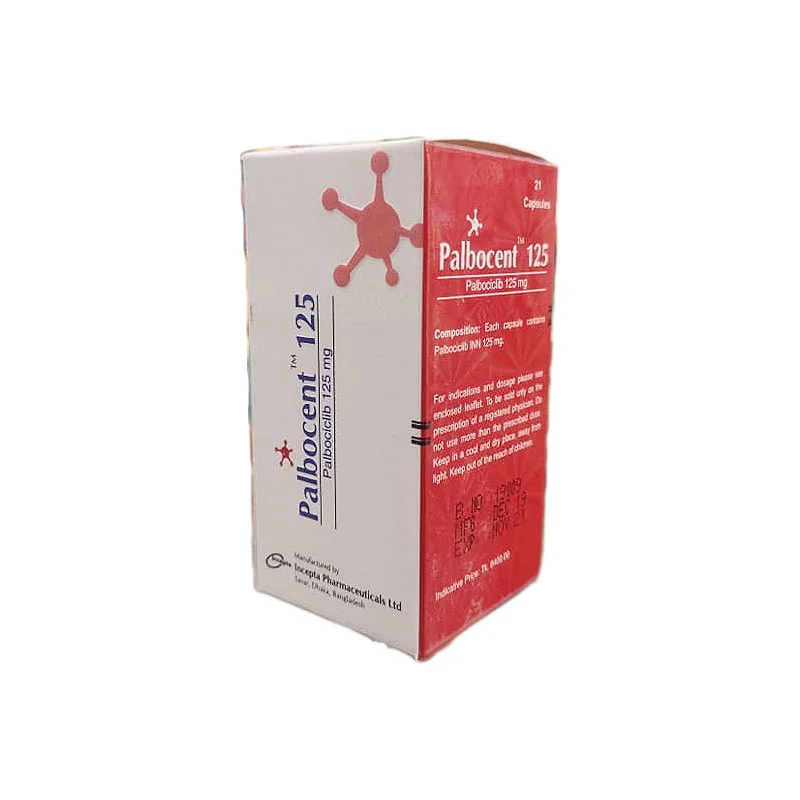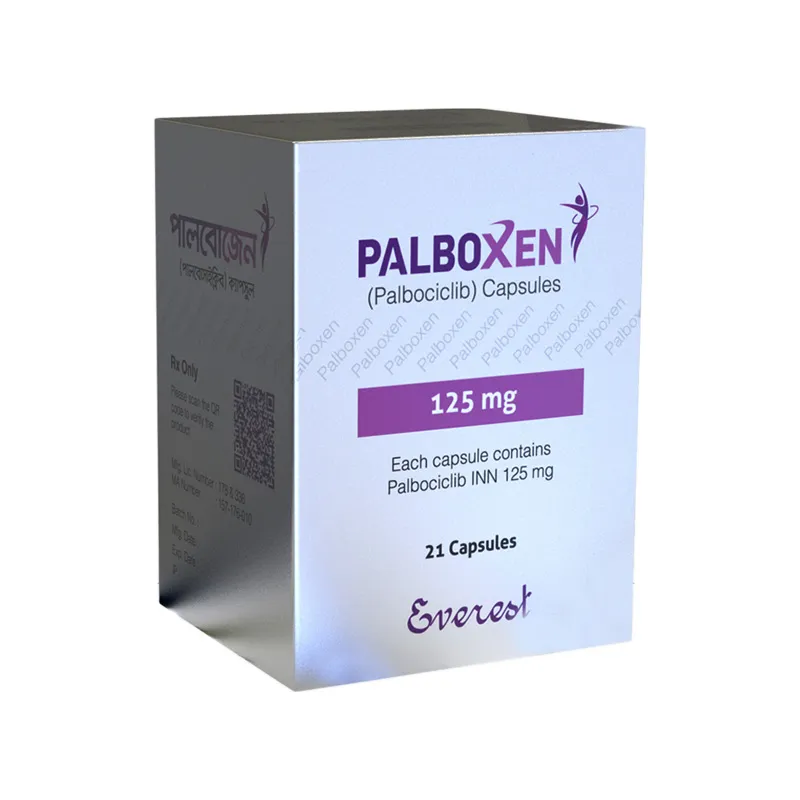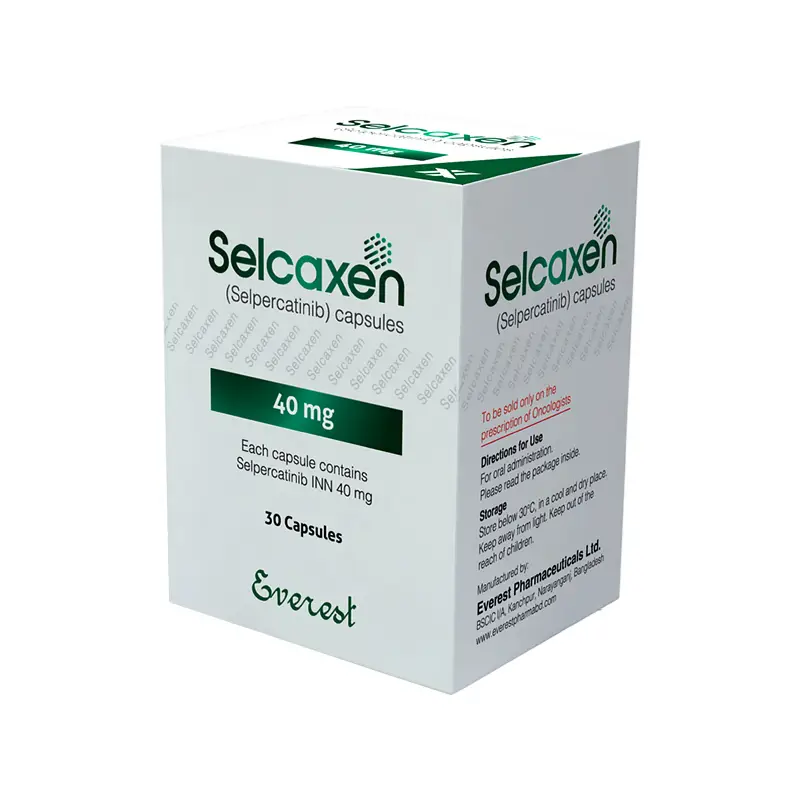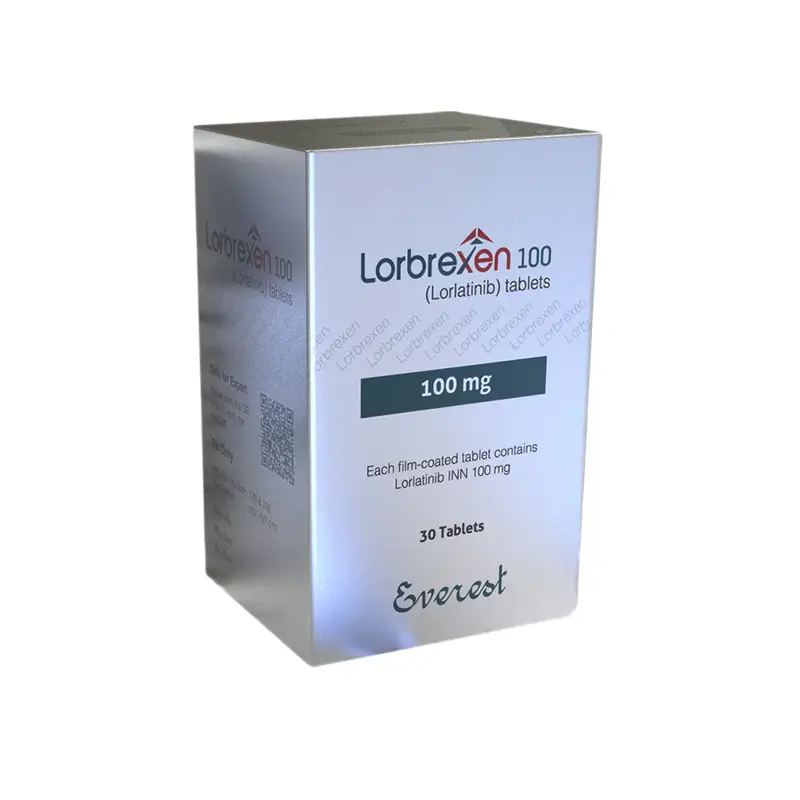Buy Generic Palbociclib Online
Inquire NowTable of Contents
ToggleWhat is Palbociclib (Palbocent)?
Palbociclib is a type of chemotherapy drug that is used to treat certain types of breast cancer. It is a kinase inhibitor, meaning it blocks the activity of specific proteins (called cyclin-dependent kinases) that play a key role in the growth and division of cancer cells. By blocking these proteins, palbociclib can slow down the growth of cancer cells and help to reduce the size of tumors.
The drug is typically used in combination with other breast cancer treatments, such as endocrine therapy or hormone therapy, to improve its effectiveness. It is approved by the US Food and Drug Administration (FDA) for the treatment of women with hormone receptor-positive, human epidermal growth factor receptor 2 (HER2)-negative advanced or metastatic breast cancer. Palbociclib has been shown to be effective in extending the time it takes for cancer to progress and can also help to improve overall survival.
Why should you buy generic Palbociclib and not the brand medicine Ibrance?
The main reason to consider buying generic palbociclib (Palbocent) instead of the brand name medicine Ibrance is cost. Generic drugs are usually much less expensive than brand name drugs, and they contain the same active ingredient and work in the same way as their brand name counterparts.
Additionally, generic drugs have to meet the same standards of quality, safety, and efficacy as brand name drugs, so there is no difference in terms of the effectiveness of the medication. The generic drug is also approved by the FDA, ensuring that it meets the regulatory requirements for safety and efficacy.
Therefore, for individuals who are seeking a more cost-effective alternative to Ibrance, generic Palbocent may be a good option to consider. However, it’s always important to consult with a healthcare professional to discuss the best treatment options for your individual needs.
Palbociclib Indication and Usage
Palbociclib is indicated for the treatment of women with hormone receptor-positive, human epidermal growth factor receptor 2 (HER2)-negative advanced or metastatic breast cancer. It is typically used in combination with endocrine therapy (such as an aromatase inhibitor) to treat this type of breast cancer.
The drug is intended for use in women who have not received prior systemic treatment for advanced disease and is used to slow down the growth and division of cancer cells. Palbociclib is intended to be used as part of a complete treatment program that may also include other medications, supportive care, and/or radiation therapy.
It is important to note that Palbociclib is not a cure for breast cancer, and its use does not eliminate the need for other treatments. It is also important to talk with a healthcare professional about the risks and benefits of using Palbociclib and whether it is an appropriate treatment option for an individual’s specific medical history and needs.
Pharmacology of Palbociclib
Palbociclib is a type of chemotherapy drug that belongs to the class of medications known as kinase inhibitors. It works by blocking the activity of specific proteins, called cyclin-dependent kinases (CDKs), which play a key role in the growth and division of cancer cells. Palbociclib slows cancer cell growth and helps reduce tumor size by blocking these proteins.
The drug is believed to work by inhibiting the activity of CDK4 and CDK6, which are involved in the regulation of the cell cycle and the progression of the G1 phase to the S phase. This leads to a reduction in the rate of cell division, ultimately leading to the death of cancer cells.
Palbociclib is metabolized in the liver and eliminated from the body via the kidneys. The drug is given as an oral tablet, typically once daily, and its effects can last for several days after the dose is taken.
It is important to note that individual responses to palbociclib may vary and that the drug may cause side effects in some individuals. It is important to discuss the potential risks and benefits of using this medication with a healthcare professional and to report any side effects to a doctor as soon as possible.
Dosage and Administration
The recommended dose of Palbociclib is 125 mg taken orally once daily for 21 consecutive days, followed by 7 days off treatment (a 28-day cycle). The drug should be taken at approximately the same time each day and should be taken with food.
The dose of Palbociclib should be reduced or discontinued if certain side effects occur, as determined by a healthcare professional. Individuals who experience severe side effects or a significant decrease in white blood cell count should discontinue use of the drug.
It is important to follow the dosing instructions provided by a healthcare professional and not change the dose or frequency of the medication without first consulting a doctor. Palbociclib should be taken as part of a complete treatment program that may also include other medications, supportive care, and/or radiation therapy.
In the event of a missed dose, the next dose should be taken at the regularly scheduled time. Do not double the dose to make up for a missed dose.
It is important to note that the safety and efficacy of palbociclib has not been established in children, and the drug is not intended for use in individuals under the age of 18.
Contraindication
Palbociclib is contraindicated in individuals who have a known hypersensitivity to the active ingredient or to any of the inactive ingredients in the drug. This means that individuals who have had a severe allergic reaction to palbociclib or any of its components should not use the drug.
In addition, Palbociclib is not recommended for use in individuals with severe liver or kidney problems, as the drug is metabolized by the liver and eliminated from the body via the kidneys.
It is important to inform a healthcare professional about any medical conditions and allergies prior to starting treatment with Palbociclib, as some medical conditions and allergies may affect the safety and effectiveness of the drug.
Additionally, women who are pregnant or who may become pregnant should not use palbociclib, as the drug has the potential to cause harm to a developing fetus. Women who are breastfeeding should also not use the drug, as it is not known whether palbociclib is excreted in human milk.
It is important to discuss the risks and benefits of using palbociclib with a healthcare professional, especially for individuals who have any medical conditions or allergies, are pregnant, or are breastfeeding.
Warnings and Precautions
Here are some important warnings and precautions associated with the use of palbociclib:
Risk of neutropenia: Palbociclib can cause a decrease in white blood cell count, which can increase the risk of infection. Regular blood tests should be performed to monitor white blood cell count, and individuals should report any signs of infection, such as fever, chills, or a sore throat, to their healthcare provider immediately.
Risk of thrombocytopenia: Palbociclib can also cause a decrease in platelet count, which can increase the risk of bleeding. Individuals should report any signs of bleeding, such as easy bruising or unexplained bleeding, to their healthcare provider immediately.
Risk of liver problems: Palbociclib can cause an increase in liver function test results. Regular blood tests should be performed to monitor liver function, and individuals should report any symptoms of liver problems, such as yellowing of the skin or eyes, dark urine, or abdominal pain, to their healthcare provider immediately.
Risk of cardiovascular events: Palbociclib has been associated with an increased risk of cardiovascular events, including heart attack, stroke, and high blood pressure. Individuals with a history of cardiovascular disease or who have risk factors for cardiovascular disease should be monitored closely for signs and symptoms of cardiovascular events.
Risk of pregnancy: Palbociclib can cause harm to a developing fetus and should not be used by women who are pregnant or who may become pregnant. Women who are of childbearing potential should use effective contraception while using the drug and for at least 3 weeks after the last dose.
Risk of harm to a breastfeeding infant: Palbociclib is not known to be excreted in human milk and can cause harm to a breastfeeding infant. Women who are breastfeeding should not use the drug.
Interactions with other medications: Palbociclib may interact with other medications, including prescription and over-the-counter medications, vitamins, and herbal supplements. It is important to inform a healthcare professional about all medications being taken prior to starting treatment with palbociclib.
It is important to discuss the risks and benefits of using palbociclib with a healthcare professional and to report any side effects or symptoms to a doctor as soon as possible. Regular monitoring by a healthcare professional is recommended while using the drug to ensure its safe and effective use.
Side Effects
Here are some common side effects associated with the use of palbociclib:
Neutropenia: Palbociclib can cause a decrease in white blood cell count, which can increase the risk of infection. This is a common side effect of the drug and can be managed with regular monitoring of the white blood cell count and appropriate medical intervention as needed.
Fatigue: Fatigue is a common side effect of palbociclib and can be managed with rest and proper nutrition.
Nausea: Nausea is a common side effect of palbociclib and can be managed with medications and proper nutrition.
Diarrhea: Diarrhea is a common side effect of Palbociclib and can be managed with medications and proper hydration.
Decreased appetite: decreased appetite is a common side effect of palbociclib and can be managed with proper nutrition and supplements as recommended by a healthcare professional.
Anemia: Palbociclib can cause a decrease in red blood cell count, which can cause anemia. This is a common side effect of the drug and can be managed with regular monitoring of the red blood cell count and appropriate medical intervention as needed.
Thrombocytopenia: Palbociclib can cause a decrease in platelet count, which can increase the risk of bleeding. This is a common side effect of the drug and can be managed with regular monitoring of the platelet count and appropriate medical intervention as needed.
Increased liver function test results: Palbociclib can cause an increase in liver function test results. This is a common side effect of the drug and can be managed with regular monitoring of liver function and appropriate medical intervention as needed.
It is important to report any side effects or symptoms to a doctor as soon as possible. The severity of side effects may vary from person to person, and not all individuals will experience the same side effects. Regular monitoring by a healthcare professional is recommended while using the drug to ensure its safe and effective use.
Drug Interactions
Palbociclib can interact with other medications and affect the way they work or increase the risk of side effects. Some medications that may interact with palbociclib include:
Strong CYP3A inhibitors: Taking palbociclib with strong CYP3A inhibitors, such as ketoconazole, itraconazole, or clarithromycin, may increase the concentration of Palbociclib in the blood, increasing the risk of side effects.
Strong CYP3A inducers: Taking palbociclib with strong CYP3A inducers, such as rifampin or St. John’s wort, may decrease the concentration of Palbociclib in the blood, reducing its effectiveness.
Anticoagulants: Taking palbociclib with anticoagulants, such as warfarin, may increase the risk of bleeding.
Anti-platelet drugs: Taking palbociclib with anti-platelet drugs, such as clopidogrel, may increase the risk of bleeding.
Hormonal contraceptives: Taking palbociclib with hormonal contraceptives may reduce the effectiveness of the contraceptives, increasing the risk of pregnancy.
Herbal supplements: Taking palbociclib with herbal supplements, such as ginkgo biloba or echinacea, may interact with the drug and increase the risk of side effects.
It is important to inform a healthcare professional about all medications being taken prior to starting treatment with palbociclib. The healthcare professional can determine the best course of action to minimize the risk of drug interactions and ensure the safe and effective use of the drug. Regular monitoring by a healthcare professional is recommended while using the drug to ensure its safe and effective use.
Use in Specific Populations
The use of palbociclib in specific populations should be based on the benefits and risks associated with its use in each population. Some important considerations include:
Pregnancy: Palbociclib is not recommended for use in pregnant women as it may harm a developing fetus. Women of reproductive potential should use effective contraception while taking palbociclib.
Lactation: Palbociclib is not recommended for use in lactating women as it is not known if the drug is excreted in human milk.
Pediatric population: The safety and efficacy of palbociclib in pediatric patients have not been established.
Geriatric population: No dosage adjustments are required for elderly patients. However, elderly patients may be more susceptible to adverse effects, and close monitoring by a healthcare professional is recommended.
Renal impairment: No dosage adjustments are required for patients with mild to moderate renal impairment. However, patients with severe renal impairment should use caution while taking palbociclib.
Hepatic impairment: No dosage adjustments are required for patients with mild to moderate hepatic impairment. However, patients with severe hepatic impairment should use caution while taking palbociclib.
It is important to discuss the specific needs and concerns of each patient with a healthcare professional to determine the best course of action for the safe and effective use of palbociclib. Regular monitoring by a healthcare professional is recommended while using the drug to ensure its safe and effective use.
Overdose
An overdose of palbociclib can cause serious side effects. If you suspect an overdose, seek emergency medical attention immediately.
The signs and symptoms of an overdose of palbociclib may include:
- Nausea and vomiting.
- Diarrhea.
- Fatigue.
- Decreased appetite.
- Decreased white blood cell count.
- Decreased platelet count.
- Decreased red blood cell count.
Treatment of an overdose may include supportive care measures, such as monitoring of vital signs, electrolyte levels, and blood counts, as well as management of any symptoms that may develop.
It is important to always take palbociclib exactly as prescribed by a healthcare professional to minimize the risk of an overdose and to ensure its safe and effective use. If you have any questions or concerns about your medication, be sure to speak with your healthcare professional.
Pharmaceutical Information
Storage
Palbociclib should be stored at room temperature, between 20°C to 25°C (68°F and 77°F). It should be protected from light and moisture.
Do not store palbociclib in a bathroom or near a sink, and keep it out of reach of children and pets.
Do not use palbociclib if it has passed the expiration date or if the packaging is damaged. If the medication is not stored properly or if it is expired, it may not work as well or may cause harm.
It is important to properly store palbociclib to ensure its safe and effective use. If you have any questions or concerns about storage, be sure to speak with your healthcare professional.
How Supplied
Palbociclib is supplied as a capsule in three strengths: 125 mg, 75 mg, and 25 mg. It is available in bottles of 21 capsules.
It is important to check the medication label before using palbociclib to ensure that you are taking the correct strength and dosage. If you have any questions or concerns about the medication, be sure to speak with your healthcare professional.
How do I buy generic palbociclib online?
Palbociclib can be purchased through a licensed online pharmacy with a prescription from a healthcare professional. Before buying palbociclib online, it is important to take the following steps to ensure a safe and reliable transaction:
- Check the website’s quality.
- Verify the prescription.
- Compare prices with other websites.
- Read reviews from customers.
- Examine the transaction’s security.
- Confirm the delivery time and the cost of shipping before placing your order.
It is important to exercise caution and due diligence when buying palbociclib online to ensure that you receive a safe and effective medication. If you have any questions or concerns about buying medication online, be sure to contact us.
You must be logged in to post a review.






Reviews
There are no reviews yet.